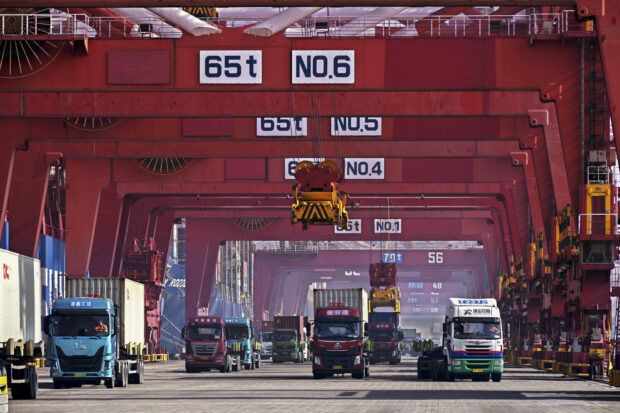China’s exports, imports returned to growth in April as demand improved

In this photo released by Xinhua News Agency, containers are unloaded from a cargo ship at Qingdao Port, east China’s Shandong Province on Feb. 11, 2024. (Li Ziheng/Xinhua via AP, File)
HONG KONG — China’s exports and imports returned to growth in April, suggesting that demand is improving despite an uneven economic recovery, according to customs data released on Thursday.
The report showed exports grew 1.5 percent in April compared to a year earlier, after falling 7.5 percent in March, the first contraction since November. Imports surged 8.4 percent in the same month, beating analysts’ expectations and up from a 1.9 percent decline in March.
China has introduced various policy support measures in recent months to support growth and boost confidence in the world’s second-largest economy.
China’s trade surplus grew to $72.35 billion, up from $58.55 billion in March.
However, the outlook is not entirely positive given broader global trends, analysts said.
READ: China’s Jan-Feb imports and exports beat forecasts
“We think export volumes will retreat over the coming months due to cooling consumer spending in advanced economies and the diminishing tailwind from lower export prices,” Zichun Huang of Capital Economics said in a note.
Export growth was mainly due to a lower base of comparison in the previous year, Huang said. She said that import volumes were likely to bounce back further in the near future due to “fiscal spending supporting import-heavy construction.”
Asean remains China’s biggest market
The 10 nations of the Association of Southeast Asian Nations remained the largest destination for China’s exports, accounting for 16.9 percent of the total for the first four months of the year, the report said.
Exports to the U.S. fell 1.6 percent in April compared to the same time a year earlier. Shipments to the European Union also declined, slipping 3.3 percent year-on-year.
READ: Between China and the US, trade takes a different route
“Considering import demand could remain resilient but exports face a higher level of risk in coming months, we expect a smaller contribution from trade to growth starting in the second quarter,” Lynn Song, an economist at ING Economics, said in a commentary.
China has struggled to bounce back after the COVID-19 pandemic, as it grapples with weaker demand globally after the Federal Reserve and other central banks raised interest rates to counter inflation. A slump in China’s property sector also is weighing on growth.
China has set an economic growth target of around 5 percent for this year, an ambition that will require more policy support, economists say.